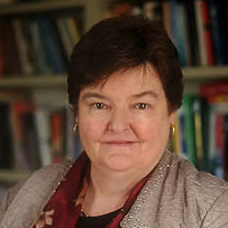
One hundred years ago this month, also at a time of deep political polarization and in the midst of the deadly Spanish Flu pandemic, Irish poet William Butler Yeats published "The Second Coming."
Two of its most quoted lines:
Things fall apart; the centre cannot hold . . . The best lack all conviction, while the worst are full of passionate intensity . . ."
In Episode 15 of the podcast The Purple Principle, “The Second Coming Turns 100," Faculty Fellow Bríona Nic Dhiarmada, Thomas J. & Kathleen M. O'Donnell Professor of Irish Studies and Concurrent Professor of Film, Television, and Theatre, looks at the historical context in which Yeats conceived and published a poem that has resonated with so many the last 100 years.
In the podcast, Prof. Nic Dhiarmada delineates the major influences at work as Yeats wrote and published “The Second Coming." She details his grave personal concerns, as the Spanish Flu afflicted both his father and pregnant wife.
She then speaks to the enduring resonance of the poem.
"Every time that we are in flux, because of the incredibly powerful nature and the oratorical power of Yeats’ poem, it speaks to us . . . [The poem] can speak to any period . . . can speak to any sense of apocalyptic dread that we have as human beings. Yeats was never specific, but managed to give voice to this existential dread that we have during periods of flux, during periods of time where we fear the apocalypse . . . we can still use his words . . . words that ring so true."
Prof. Nic Dhiarmada is the originator, writer, producer, and executive producer of the award-winning, multi-part documentary series 1916 The Irish Rebellion and its 86-minute feature version—both richly detailed chronicles of the early 1900’s with references to Yeats’ central role in promoting the Irish cultural renaissance that preceded rebellion and the war for independence.
In the podcast of the preceding week [No. 14], Pulitzer-prize-winning poet Paul Muldoon speaks about the poem’s remarkable insight and longevity, the influences at work on Yeats as he wrote it, and the impact Yeats still exerts on poetry today.
The Second Coming" William Butler Yeats (November 1920)
Turning and turning in the widening gyre
The falcon cannot hear the falconer;
Things fall apart; the centre cannot hold;
Mere anarchy is loosed upon the world,
The blood-dimmed tide is loosed, and everywhere
The ceremony of innocence is drowned;
The best lack all conviction, while the worst
Are full of passionate intensity.
Surely some revelation is at hand;
Surely the Second Coming is at hand.
The Second Coming! Hardly are those words out
When a vast image out of Spiritus Mundi
Troubles my sight: somewhere in sands of the desert
A shape with lion body and the head of a man,
A gaze blank and pitiless as the sun,
Is moving its slow thighs, while all about it
Reel shadows of the indignant desert birds.
The darkness drops again; but now I know
That twenty centuries of stony sleep
Were vexed to nightmare by a rocking cradle,
And what rough beast, its hour come round at last,
Slouches towards Bethlehem to be born?
Read more: The Poetry Foundation